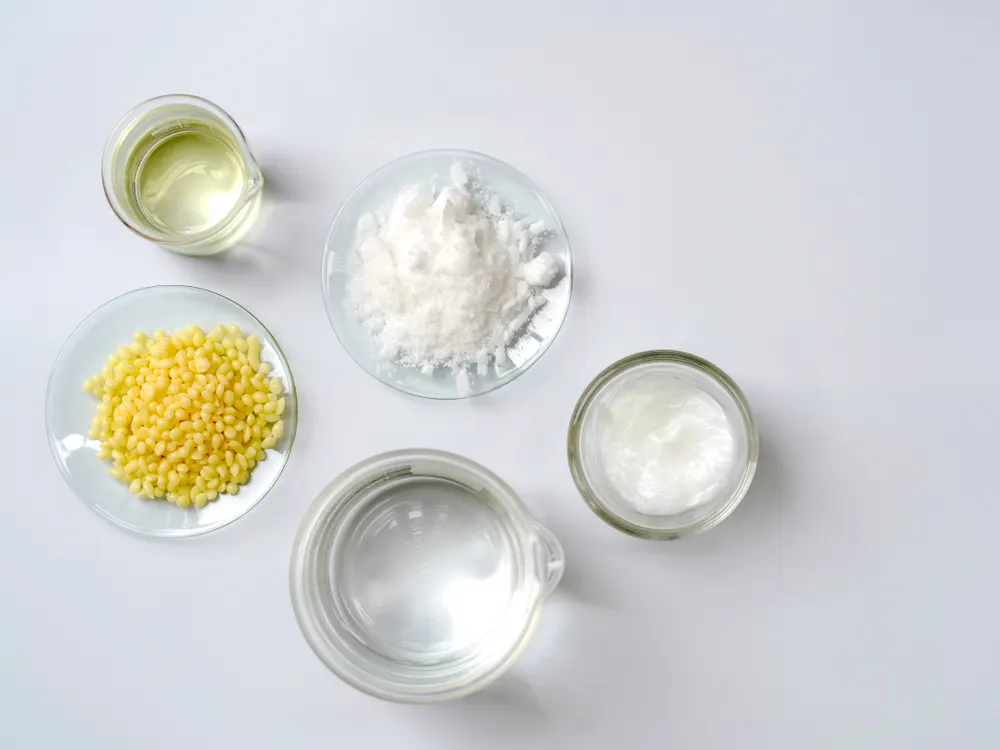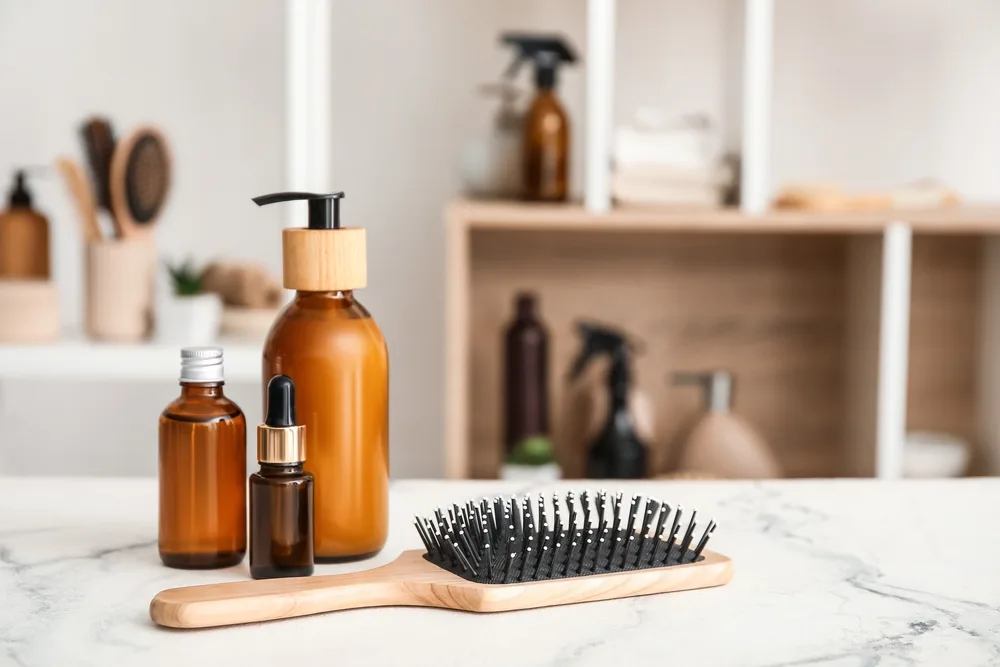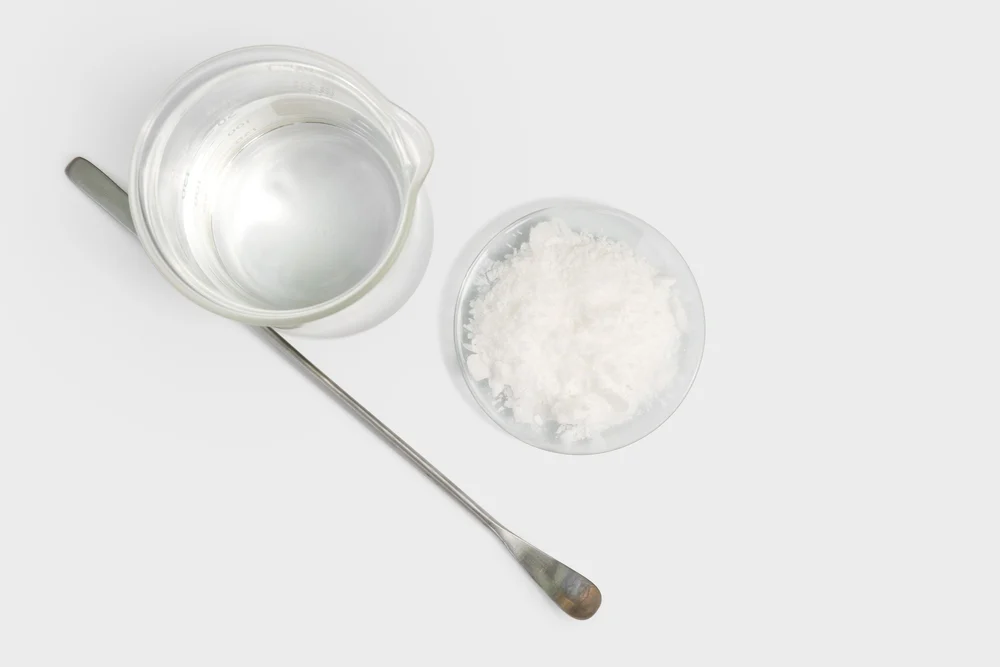Jump to:
Hair care products are infused with several ingredients, some of which are problematic. Among the components that continue to raise eyebrows is cetyl alcohol. So, is cetyl alcohol bad for hair?
Is Cetyl Cohol Good for Hair?
Cetyl alcohol is long-chain fatty alcohol and a common ingredient in shampoos, conditioners, lotions, and body creams. It’s usually added to aid better distribution of products on the hair.
Cetyl alcohol is good for hair; it’s one of the skincare ingredients approved by the US Food and Drug Administration. The Cosmetic Ingredient Review Panel also approved cetyl alcohol as non-toxic, non-sensitizing, and safe to use in cosmetic products manufacture.
Now that you know cetyl alcohol is safe for your hair, here’s a recap of what to expect in this article:
- Where does cetyl alcohol come from?
- What’s its role in cosmetics?
- How does it benefit the hair?
- What else is it used for?
Keep reading to discover more about this fatty alcohol used in hair care products.
Where Does Cetyl Alcohol Come From?

Chadchai Krisadapong/Shutterstock
Cetyl alcohol comes from vegetable oils, including coconut and palm oils. This fatty alcohol is 95 percent natural but can also be obtained from petroleum or synthesized in a laboratory.
It’s a waxy white powder at room temperature and may also be in the form of white flakes. It’s added to both leave-in and rinse-out hair conditioning products. It has a higher viscosity but breaks down over time.
That’s why it’s often combined with stearyl alcohol, which is more stable. The combined product, Cetearyl alcohol, is stable and viscous. Other fatty acids good for your hair and added alongside cetyl alcohol include:
- Behenyl alcohol
- Lauryl alcohol
- Myristyl alcohol
Short-chain alcohols such as ethanol are bad for your hair. They’re added to products that dry your hair, such as sprays. Other drying alcohols you shouldn’t use regularly include:
- Alcohol denat
- SD alcohol 40
- Propanol
- Isopropyl
- Propyl
Companies are allowed to label their hair products as “alcohol-free” if they contain fatty alcohols and not simple alcohols like ethanol.
Read Next: What Is the Ingredient in Shampoo That Causes Hair Loss?
Cetyl Alcohol Toxicity
Cetyl alcohol is generally safe for everyday hair use. It’s also non-irritating to the eyes. However, people with sensitive skin, eczema, psoriasis, and rosacea are advised to perform a skin patch test when using products containing cetyl alcohol.
The reason is that synthetic fatty alcohols, like cetyl alcohol, can slightly interfere with the epidermis’ lipid bilayer, causing contact allergies. Can you drink cetyl alcohol?
Unlike simple alcohols like ethanol, fatty alcohols cannot intoxicate you. You could even end up vomiting. It’s toxic to humans when ingested orally at doses of 5g/kg or greater.
Inhalation of 26 ppm of cetyl alcohol vapors also irritates mucous membranes of an animal’s eyes, throat, nose, and respiratory system. Keep your pets from getting too close to cetyl alcohol. Small amounts than these are safe.
The Role of Cetyl Alcohol in Hair Products

Pixel-Shot/Shutterstock
Cetyl alcohol is a common ingredient in hair care products due to its good properties. One of its main functions is to act as an emulsifier that keeps water and oil in hair products from separating, giving them proper consistency. Cetyl alcohol also serves the following functions:
Emollient
As a long carbon chain alcohol, cetyl alcohol is an excellent emollient. It softens your hair and creates a lipid barrier that traps water and prevents it from evaporating. The result is hydrated and conditioned hair that’s visibly smooth.
Thickening Agent
Cetyl alcohol makes hair products thick and creamy by improving consistency, viscosity, and adhesion. This improves their texture and gives them slip, enabling them to move between hair strands and evenly distribute the product.
Surfactant
Cetyl alcohol acts as a surfactant by lowering the surface tension of water, making it more likely to interact with oil and grease in the hair. The dirt and grease are emulsified and can be washed away easily.
Cetyl alcohol also increases the foaming ability of shampoos and acts as an opacifier during the manufacture of opaque shampoos.
Benefits of Cetyl Alcohol to the Hair
Cetyl alcohol is a major ingredient in hair care products like shampoos, leave-in, rinse-out conditioners, deep-penetrating treatments, and hair masks. It’s added to such hair care products due to its immense beneficial properties.
It nourishes the hair, giving it bounce and vibrancy and eliminating your hair woes. What other benefits come with having Cetyl alcohol in your hair care products?
Hydrates Dry Hair
Dry hair can arise from harsh weather, heat, and chemical damage. Cetyl alcohol hydrates hair strands, seals hair cuticles and prevents moisture from escaping.
Detangles Frizzy Hair
Detangled hair is difficult to comb because the strands are intertwined. Cetyl alcohol provides slip to the hair, making it softer and more manageable. It smooths the hair strands, giving them a silky finish.
Cetyl alcohol gives softer, shinier hair that detangles easily and is less prone to chemical or heat damage. It also stabilizes a shampoo’s foam to give it a more luxurious feel.
Read Next: How to Get Rid of Frizzy Hair and How to Detangle Matted Hair
Other Uses of Cetyl Alcohol

Chadchai Krisadapong/Shutterstock
Cetyl alcohol has other uses besides hair care products. It’s used in body creams, bath oils, makeup, and lipstick because it melts at a higher temperature than typical human body temperature. That’s why makeup and lipstick don’t melt on the face.
The rise of the anti-aging skin care industry has also seen an increased use of cetyl alcohol in their products. The increased demand is due to its emollient properties that promote youthful skin. Industrially, cetyl alcohol is a main ingredient in chemicals, fuels, and plastic.
It’s a lubricant for nuts and bolts and is also safe as a food additive in cakes and candy. Cetyl alcohol is obtained by heating coconut oil, sodium hydroxide, and an alkaline solution.
Read Next: Is Coconut Oil Good for Your Low Porosity Hair?
Frequently Asked Questions
Here are some of the most commonly asked questions regarding cetyl alcohol for hair.
What does cetyl alcohol do to hair?
Cetyl alcohol hydrates hair that’s dried out by heat or chemical styling. The moisturizing properties seal the hair cuticles, making them softer and silkier. It also detangles frizzy hair by providing slip qualities.
Is cetyl alcohol bad for curly hair?
Cetyl alcohol is good for your curls. It adds moisture and helps retain curls so they won’t end up falling flat. Avoid hair care products with non-fatty alcohols because they will suck the moisture out of your hair.
Are cetyl and cetearyl alcohols different?
Cetyl alcohol is made up of one chemical compound. It’s used as a thickening agent, an emulsifier, and an emollient. On the other hand, cetearyl alcohol is a mixture of fatty alcohols used as a surfactant and foam booster.
Does cetyl alcohol cause build-up on hair?
Too much cetyl alcohol will build up on your hair and give it a matted look. Cetyl alcohol is oilier than other fatty alcohols and therefore moisturizes hair more. Only add little portions to your hair.
Does cetyl alcohol have side effects?
Cetyl alcohol is safe for topical use but shouldn’t be used for therapeutic purposes. Do a patch test to watch for allergic reactions such as redness, inflammation, and swelling. Don’t apply it to broken skin. Always use it in moderation.
So, Is Cetyl Alcohol Bad for Hair?
Cetyl alcohol is good for your hair. It adds moisture to hair and contains oils that soften rough cuticles and detangle frizzy hair. It plays the role of emulsifier, emollient and thickening agent during the manufacture of hair care products.
Cetyl alcohol is non-toxic, but its vapors can irritate your pet’s mucous membranes. So always be careful when using it, and if you’re in doubt, speak to a licensed medical professional to determine if it’s right for you. Happy styling!
